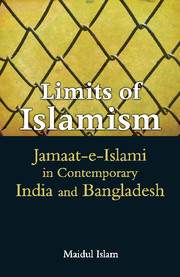Book contents
- Frontmatter
- Dedication
- Contents
- List of Tables
- Acknowledgements
- Introduction: Islamism(s) of Academics and Islamists
- Chapter 1 Islamism and Ideology: Philosophical Issues and Analytical Categories
- Chapter 2 Islamism in Neoliberal India
- Chapter 3 Ideological Articulations of Jamaat-e-Islami Hind
- Chapter 4 Islamism in a Muslim Majority Context: The Case of Bangladesh
- Chapter 5 The Crisis of Islamist Populism of Bangladesh Jamaat-e-Islami
- Chapter 6 Islamism in Contemporary India and Bangladesh: Comparative Overview of the Politics of Alternative
- Appendix
- Bibliography
- Index
- About the Author
Chapter 4 - Islamism in a Muslim Majority Context: The Case of Bangladesh
Published online by Cambridge University Press: 05 April 2015
- Frontmatter
- Dedication
- Contents
- List of Tables
- Acknowledgements
- Introduction: Islamism(s) of Academics and Islamists
- Chapter 1 Islamism and Ideology: Philosophical Issues and Analytical Categories
- Chapter 2 Islamism in Neoliberal India
- Chapter 3 Ideological Articulations of Jamaat-e-Islami Hind
- Chapter 4 Islamism in a Muslim Majority Context: The Case of Bangladesh
- Chapter 5 The Crisis of Islamist Populism of Bangladesh Jamaat-e-Islami
- Chapter 6 Islamism in Contemporary India and Bangladesh: Comparative Overview of the Politics of Alternative
- Appendix
- Bibliography
- Index
- About the Author
Summary
In the previous two chapters, I have discussed the ideological articulations of Jamaati Islamism in a Muslim minority context of India. In the following two chapters, I will focus on the ideological articulations of Jamaati Islamism in the Muslim majority country of Bangladesh, a close neighbour of India. But before doing so, it is important to briefly discuss the politico-ideological background under which the rise of Islamist forces like Jamaat in Bangladesh became possible.
Bangladesh had a glorious history of liberation under the leadership of Sheikh Mujib's Awami League in the early 1970s. Despite the fact that the US, a major superpower, ‘extended overwhelming support towards Pakistan during the Bangladesh Liberation War in 1971’, the Bangladeshi people fought a successful liberation war with secular-nationalist vision and emerged as an independent nation-state by seceding from Pakistan. During the Bangladesh liberation war, both the cold war politics and the South Asian regional dynamics came into play when Pakistan got the support of both the US and China, while Sheikh Mujib got help from India, known as a Soviet Union ally at that time. When Bangladesh faced the famine of 1974, the decision of the US government to call- off food shipments on the pretext that Bangladesh was a ‘communist ally’ led to a grave ‘national tragedy’. The US policy to contain ‘socialism’ in Bangladesh partly facilitated the environment for the emergence of ‘anti-US Islamism’ in the country.
In the recent past, Bangladesh has witnessed an Islamic conservative ascendancy with the rise of Jamaat-e-Islami and other Islamist forces. It is interesting to note that the same Jamaat-e-Islami, which opposed the creation of Bangladesh as a separate nation-state from Pakistan, till recently, enjoyed political power in alliance with a coalition government led by the Bangladesh Nationalist Party (BNP) leader Begum Khaleda Zia from 2001 to 2006. Thus, independent Bangladesh saw a shift of the political discourse of secular-nationalism, the cherished principle of Bangladeshi freedom struggle towards Islamist tendencies in the recent past.
- Type
- Chapter
- Information
- Limits of IslamismJamaat-e-Islami in Contemporary India and Bangladesh, pp. 170 - 199Publisher: Cambridge University PressPrint publication year: 2015



